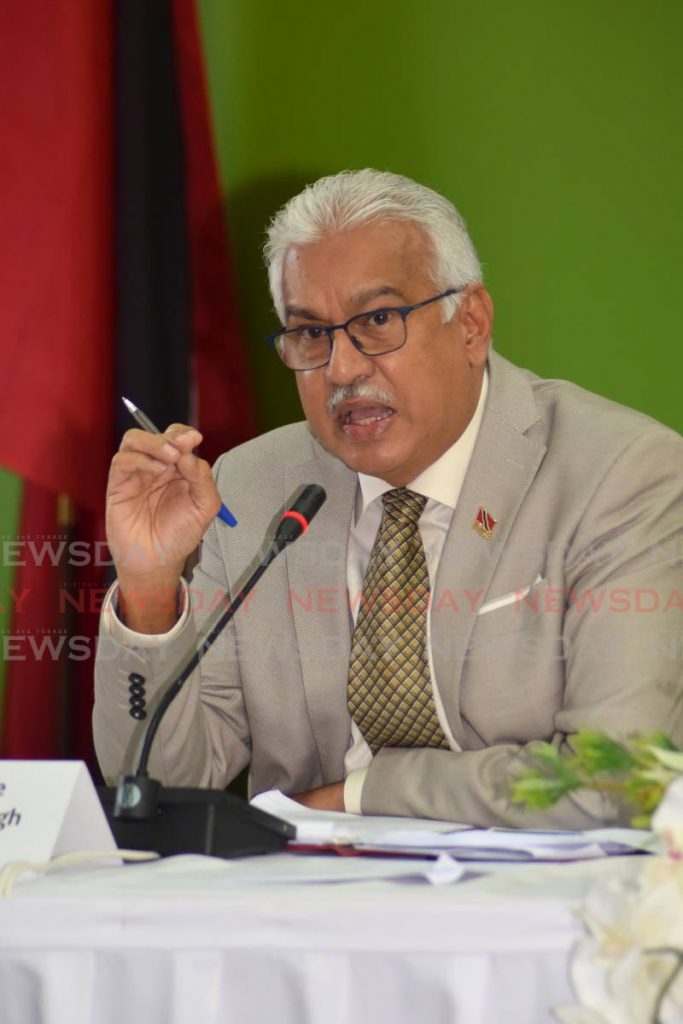Deyalsingh: Hostility does not help contact tracing

HEALTH Minister Terrence Deyalsingh has revealed that ministry officials have been met with open hostility from the public when they have tried to engage them in order to do contact tracing after identifying people infected with covid19.
Chief Medical Officer Dr Roshan Parasram underscored the importance of contact tracing, especially as he said TT has entered a new phase of infections. He said new cases so far show that sporadic spread is taking place.
At the virtual health news conference on Wednesday, Deyalsingh said signficant contact tracing is taking place in light of a recent spike in infections. However, he disclosed, "We have been getting a lot of problems recently with contact tracing."
Deyalsingh said these problems include "some people being very unco-operative and very hostile with the contact tracers." He said people are flat out refusing to answer their phones, "especially when they realise that the number that comes up on their phones is a ministry number doing the contact tracing."
When this happens, Deyalsingh said, "This means we have to expend resources and slow up the contact tracing process by physically driving to a location where we have to do contact tracing." Deyalsingh said some people are objecting to questions being asked, because they think it's an invasion of their privacy.
While this is understandable, Deyalsingh said, "Not to be unkind, but on follow-up examinations we are uncovering persons who are deliberately withholding useful information."
He urged people to be more co-operative with the ministry because the information they provide can make the difference in ensuring the health not only of their immediate family, friends and co-workers but also the nation.
Deyalsingh said effective contact tracing ensure that institutions where suspected covid19 cases have occurred could be closed for shorter periods of time or not at all.
Through contact tracing officials try to identify and locate people who have been in physical contact with an infected person in order to test them for the virus and/or ensure they go into self-quarantine. Contact tracing also helps identify places visited by an infected person so that sanitisation can be done.
After three months of lockdown during the pandemic, Deyalsingh said the "strategic, surgical strikes" being undertaken on individual businesses and/or schools where suspected covid19 cases occur are a better alternative than returning to a total national lockdown scenario, which could damage the economy, especially over a protracted period.
Parasram said, "The first phase of this epidemic began in TT on March 12. It was accelerated by the influx of approximately 20,000 people coming through our airports and seaports."
After saying this phase lasted five to six weeks, Parasram said the first local covid19 case on July 20 suggested "this is likely to be the start of a new phase of covid19 infections in TT."
He said the ministry's main goal is to continue to limit the spread of the disease through rapid contact tracing, quarantine and testing of all infected individuals. Parasram noted the closure of three schools, the police offices at Riverside Plaza and parts of its administration building in Port of Spain, in response to covid19 concerns.
"We will continue to close as many places as necessary," Parasram said, adding this is done to limit exposure, sanitise places and reopen them once the people there are covid19-negative. He was confident that with strict adherence to public health measures and recommendations, "We can once again control the spread of covid19 in TT."
As of 10 am on Wednesday, there were two new cases, bringing to 156 the number of people testing positive for the virus. Of these two new cases, one is a primary contact of a recent positive case, and the other had contact with covid19 patients.
As of 10 am on Wednesday, 6,955 samples had been submitted to the Caribbean Public Health Agency (CARPHA) and UWI site for testing. Of these, 5,395 were unique patient tests while 1,560 were repeated tests.
Eight people have died from the disease locally and 128 people have been discharged.
Nineteen patients are at Caura Hospital and one is at the Couva Hospital and Multi-Training Facility.
No patients are at any of the country's step-down/transition facilities.


Comments
"Deyalsingh: Hostility does not help contact tracing"